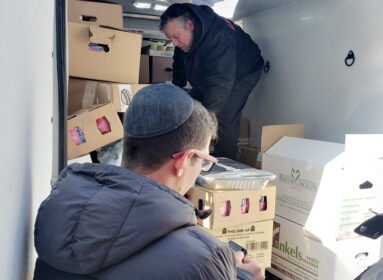
By Cindy Mindell
 Cantorial Soloist Marian Kleinman
Cantorial Soloist Marian Kleinman
Farmington Valley Jewish Congregation–Emek Shalom (FVJC)
Simsbury
Marian Kleinman just keeps saying “yes” when asked to serve the Jewish community, and soon she will be invested as a cantor. A native of Rockland County, N.Y., Kleinman grew up in a home filled with Jewish music and in a family who helped start Temple Beth Sholom in New City, where her mother, a Holocaust survivor and young singing prodigy, taught music and served as cantorial soloist.
Kleinman holds a BA from Ramapo College of New Jersey and a Master’s degree in creative writing from the City College of New York. After earning a dual New York State teaching certification in English and social studies, she taught in public schools and community colleges in New York. In the late ‘90s, she and her husband moved to Wilmington, N.C., where they joined Temple of Israel. Kleinman became the religious school principal, organized a choir, and taught b’nai mitzvah.
Five years later, the couple moved to Liberty, N.Y. and joined Congregation Agudas Achim in Livingston Manor, where Kleinman spent nine years alongside the cantor, conducting a bimah band and singing as cantorial soloist. Two years into the job, she applied to the Academy for Jewish Religion (AJR) Cantorial Program and soon after, received an invitation to apply for the principal’s position at Beth Am Temple religious school in Pearl River, N.Y. She was accepted by both institutions and deferred her admission to AJR, working for the next seven years at Agudas Achim and Beth Am. Last May, she completed part of the cantorial program, earning her Master’s degree in Jewish Studies online. She will resume her coursework at AJR this year.
Kleinman comes to FVJC as cantorial soloist and religious school principal after serving for a year in the same dual role at Congregation Shaarai Shomayim in Lancaster, Pa. She is a former board member of the Women Cantors’ Network.
“Jewish learning extends from classrooms into sanctuaries and out to the world,” she says. “As a child of a Shoah survivor, my central belief, based on my mother’s experiences, is Hillel’s teaching: ‘Where people are acting inhuman, we must strive to be human.’ I love Jewish music, I love to sing and play guitar, and I’m a people-person. I come in with a public school teaching background and an understanding of student needs and creating a strong environment for students and their teachers. I am very passionate about our Jewish heritage and I love seeing children get excited about being Jewish when they have a special experience.”
Kleinman lives in West Simsbury with her husband, Mark, and their (almost) 14-year-old daughter, Rosa.
 Rabbi Eli Kohl
Rabbi Eli Kohl
Young Israel of Stamford
Rabbi Eli Kohl agrees with Rabbi Nachman of Breslov, who taught that music is the universal language of the soul.He also has found multiple other ways to connect with fellow Jews.
Kohl grew up in an Orthodox community in Brooklyn, in a music-filled home where his mom played guitar and the stereo played Paul Simon, Elton John, and Peter, Paul and Mary alongside Shlomo Carlebach, The Diaspora Yeshiva Band, and The Rabbis’ Sons. As a kid, Kohl taught himself piano and guitar and attended a Modern Orthodox high school, where his musical influences expanded to include punk rock and grunge, and eventually to jam bands like the Grateful Dead and Phish. After studying at Yeshivat Hakotel in Jerusalem, he earned a BA in sociology at Yeshiva University and went on to YU’s theological seminary, where he was ordained in 2006. For the next seven years, he served as the rabbi of the Orthodox community at the University of Maryland Hillel.
“I think that having had different kinds of experiences allows me to facilitate different entry points into Judaism for many kinds of Jews,” he says. “I enjoy connecting with people and I love teaching and studying Torah. I am able to relate to different types of people as I wear different ‘hats:’ teacher, friend, shepherd, spiritual advisor. I have worked with people across the age spectrum and in a variety of settings, using my talents to connect to people, not only through prayer and study, but also through sports, meditation, and music. In every avenue of life, I help people make a connection to God.”
While the satisfaction of working with 18- to 22-year-olds comes from providing support at a critical junction in young Jewish lives, Kohl gets another kind of gratification from serving a congregation.
“What I really like about being a pulpit rabbi is the ability to be creative and helping nurture a synagogue where lots of different types of Jews feel comfortable,” he says. “I really like the creativity involved in sermonizing and teaching.”
Kohl shares both musicality and profession with his twin sister, Rachel Finegold, who is one of the first three women ordained by Rabbi Avi Weiss as an Orthodox clergywoman known as a maharat.
Kohl comes to Young Israel from Mount Kisco, N.Y., where he was spiritual leader of the Mount Kisco Hebrew Congregation and a member of the Pastoral Care team at Northern Westchester Hospital. He has completed training toward a certificate from Machon Puah in Reproductive Health and Halacha.
In addition to leading the Young Israel congregation, Kohl has joined the teaching staff of Bi-Cultural Day School in Stamford, where he will teach sixth and seventh grade Judaics and participate in other aspects of school life. His wife, Naomi, has taken a position at Jewish Family Services of Greenwich (see story p. 12).
 Interim Rabbi Amy Levin
Interim Rabbi Amy Levin
Congregation Rodeph Sholom
Bridgeport
Rabbi Amy Levin comes to Congregation Rodeph Sholom from a one-year stint as interim rabbi of Congregation Beth Shalom in Pittsburgh. She led Temple Torat Yisrael in East Greenwich, R.I. from 2004 to 2014. While there, she served as president of the Greater Rhode Island Board of Rabbis and was named 2013 “Faith Leader of the Year” by the Rhode Island State Council of Churches.
A New Jersey native, Levin sees the rabbinate as a mission, not just a job.
“I wanted to be a rabbi before I even started to prepare for my bat mitzvah; more than a decade before anyone was ordaining women,” she says. “It took me a very long time to get here, and it’s all I ever hoped it would be. I did some other interesting things along the way, but they were all second-best to being a rabbi. I really never wanted to be anything else.”
Levin earned a BA in the Humanities and Art History from the Johns Hopkins University in 1975 and served as the vice principal of the Academy for Jewish Studies High School in Essex County, N.J., before making aliyah in 1981. She was the second woman to be ordained by the Schechter Institute of Jewish Studies, the rabbinic seminary of the Israeli Masorti (Conservative) Movement, and then served as rabbi of several Jerusalem congregations.
From 2008 to 2012, Levin was a mentor for senior rabbinical students in the Jewish Theological Seminary’s Legacy Heritage Rabbinic Fellows Program. She has taught at several Jewish institutions of higher learning in the U.S. and Jerusalem. Since her ordination, Levin has continued her rabbinic studies through the Rabbinical Assembly’s Rav Hamachshir program. She is a member of the Rabbinical Assembly’s Committee on Jewish Law and Standards.
“Being a rabbi is a challenge and a privilege,” she says. “I get to invest my time, training, experience and energy in the tradition that I love, in people I love and admire and in congregations that I hope to help thrive. My calling creates opportunities to share moments of great joy and challenge with deeply good people.”
Levin says that the interim rabbinate is particularly fulfilling work, as she spends a year serving a congregation in a traditional role as teacher, pastoral counselor, advisor, spiritual and halakhic leader, and also as a consultant-in-residence with a congregation that is working out its priorities and goals. She says she is a “matchmaker” who helps behind the scenes as the congregation looks for its “bashert” rabbi.
“If I do my job well, I am leaving a happier congregation than I found, and I am handing the congregation over to a colleague who will enjoy a very long and happy relationship with the congregation.”
Levin designs and needlepoints her own kippot. (“That way, I can always be color-coordinated,” she says.) She trains her dogs for therapy and agility, and earned an American Kennel Club Canine Good Citizen title. She also does musical canine freestyle, a modern dog sport that is a combination of obedience training, tricks and dance.
 Rabbi Ita Paskind
Rabbi Ita Paskind
Congregation Beth El
Norwalk
Rabbi Ita Paskind grew up in a Conservative home in Lakewood, N.J., a Jewish community in transition where her father, Rabbi Lee Paskind, was spiritual leader of Congregation Ahavat Shalom. “Lakewood was becoming ultra-Orthodox and we were the family of the Conservative rabbi, so it was a very interesting place, Jewishly, to be growing up,” she says. “We had a lot of Judaism in our home and we were part of this much larger Jewish world in Lakewood, but at the same time, I was very different from them: I was a girl who learned how to read Torah, who fell in love with Israel and wanted to dress on Shabbat like Israelis do, and that doesn’t really match what the ultra-Orthodox community was wearing on Shabbat. So there was a lot of ‘Are we going to talk to her, are we not going to talk to her?’ that I used to observe on Shabbat.”
Paskind attended a Solomon Schechter day school and the public high school, spending the summer before senior year on the USY Israel Pilgrimage.
“That’s when my personal Jewish journey really took off,” she says. “It was life-changing, both in terms of my commitment to Judaism and in terms of my own sense of self and independence.”
As a result, Paskind returned to Israel after high school for a year with the Nativ College Leadership Program before entering the joint Columbia University-Jewish Theological Seminary BA program. She earned a BA in Psychology and a BA in Talmud. “I really felt myself come alive with all the Jewish studies, in a way that I hadn’t experienced when I was a kid,” says Paskind, who then decided to go to rabbinical school, but only after a long struggle.
“It was not a cut-and-dried decision for me, because I had seen from pretty close up the challenges of being a congregational rabbi and when I was a kid, I didn’t really understand that girls and women could be rabbis,” she says. “On the one hand, I loved the Jewish stuff, and Talmud in particular, but I also knew that I didn’t want to experience some of the same experiences that my dad had in the pulpit. Eventually, the love of Judaism won out, and the idea that I could spend another year in Israel during rabbinical school and study a lot more Talmud at JTS really pushed me to apply and once I got in, I was excited about it.”
Paskind earned a Master’s in Jewish Education and was ordained in 2010 and joined Congregation Olam Tikvah in Fairfax, Va. as assistant rabbi.
“I was really lucky because I found in the congregation a lot of the values that I have as a Jew and as a rabbi,” she says. “The Beth El community has a lot of those things too, which feels like a very good match.” Not only is the congregation warm and welcoming, but many members take leadership roles in services and other aspects of synagogue life.
Paskind intends to do a lot of listening during her first year at Beth El. “I want to hear what people want, where they are in their lives, and what the community has been experiencing for the last number of years,” she says. “And then we’ll figure out together what’s going to come next.”
 Rabbi Ari Rosenberg
Rabbi Ari Rosenberg
Temple Sholom
New Milford
Rabbi Ari Rosenberg figures that he considered the rabbinate earlier than most people who enter the profession because of his father, Rabbi Aaron Rosenberg, who just retired after 30 years at Temple Emanu-El in Waterford.
“When I was a child, I went to services that my father was leading, so he was the role model that I had,” Rosenberg says. “When I was in fifth grade, we did the mock wedding in Hebrew school and I played the role of the rabbi. It was something that I considered throughout my whole life.”
But following in his father’s professional footsteps wasn’t a given. Rosenberg earned a BA in English from Rutgers University in 1996 and was ordained at Hebrew Union College-Jewish Institute of Religion 12 years later. In between, he worked as a teacher, graduate student advisor, and paralegal, “just to make sure that this was definitely what I wanted to do,” he says. “At some point, I realized that what I really needed most in my life was to be in the center of the Jewish community, officiating at lifecycle events and leading services and helping to teach people about our heritage and traditions and sharing the joy of Judaism with the Jewish community.”
After ordination, Rosenberg served for four years as associate/assistant rabbi of Hevreh of Southern Berkshire in Great Barrington, Mass., and then as rabbi of Temple Sha’arey Shalom in Springfield, N.J.
Watching his parents serve the Jewish community, Rosenberg feels well prepared for Jewish professional life.
“Both of my parents have a tremendous amount of energy and chose to channel it into helping the Jewish community,” he says. “So I have tons of energy and it really is an honor and privilege for me to be able to focus that energy toward enriching people’s Jewish lives and Jewish experiences. This is a perfect job for me and it’s the best decision I made in my life and I love every minute of what I do.”
Rosenberg played clarinet and sousaphone as a kid, a skill that no doubt helped him become the ba’al tekiah (shofar-blower) at Temple Emanu-El after his bar mitzvah and until he left for college. He has been known to hold a blast for more than a minute.
Rosenberg has two children – Ezra, 12, and Maayan, 8. In March, he will officiate at his first Temple Sholom bar mitzvah – his son’s.
 Interim Rabbi Scott Saulson
Interim Rabbi Scott Saulson
Temple Emanu-El
Waterford
Rabbi Scott Saulson just completed a one-year stint as interim rabbi of Temple Sholom in New Milford.
He grew up in Miami Beach, a period he describes as “a gentle life where we were unencumbered by the sub rasa discrimination against Jews at some of the more prominent establishments.” His father came from a “pioneer” family of traditional Judaism in Michigan. His mother’s family, early settlers in Miami Beach, were charter members of the flagship Reform congregation of Greater Miami. Saulson grew up in a Conservative home until he left for college, at which point his family affiliated with that Reform synagogue.
After earning a BA from the University of Michigan, serving in the Peace Corps for two years, and completing a Master’s degree in International Relations at the University of Miami, Saulson entered Hebrew Union College and was ordained in 1976. He went on to earn a PhD in Semitics from the University of South Africa and settled in Atlanta, Ga. in 1991, where he served for 14 years as chaplain to the Jewish community through Jewish Family & Career Services.
“I can’t say that my embarkation was a result of an epiphany,” he says. “Rather, it seems that it was an evolutionary process prompted by doubts about diplomatic service – though some would argue the rabbinate is not far removed from that skill set – a desire of a meaningful leadership role, and the specter of the Vietnam draft.”
In 2007, Saulson established Moving Parents©, where he provides counseling and mediation to families dealing with the issues of eldercare for aging parents and relatives. Saulson is a member of the National Association of Jewish Chaplains and of the Association of Clinical Pastoral Education and a charter member of the Atlanta Chapter of the National Aging in Place Council.
“Working with families, confused or conflicted about life transitions in the upper decades, in order to attain a sense of calmness and progress, is, in many ways, not much different than my interim rabbinic work,” he says. “As an interim rabbi, I am fully dedicated to the latter so, at the moment, I might compare my work with elders and their families as a rewarding avocation.”
What excites Saulson about the work of an interim rabbi is the opportunity to explore new ground, “both in terms of interpersonal relationships and geography,” he says. “In addition, there is a rare kind of flourishing of excitement and reflection when a congregation is on the doorstep of a major milestone in its development. The challenges of contemporary Jewish synagogue life can come into sharp relief.”
In a serendipitous turn of events, Saulson is replacing Temple Emanu-El’s Rabbi Aaron Rosenberg, who is retiring. Rosenberg’s son, Rabbi Ari Rosenberg, is replacing Saulson as the new full-time rabbi of Temple Sholom.
Saulson says that he accepted the position at Temple Emanu-El because “I was invited to succeed a very fine rabbi and enter into a welcoming and open-minded atmosphere in an appealing part of the country.”
Saulson lives in East Lyme and commutes monthly to Atlanta, where his wife, Dr. Diane Wulfsohn, works as a clinical psychologist. They have two daughters, Raelle and Aliya.
Comments? email cindym@jewishledger.com.








 Southern New England Jewish Ledger
Southern New England Jewish Ledger








